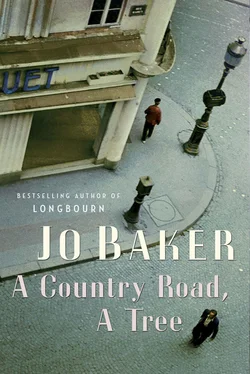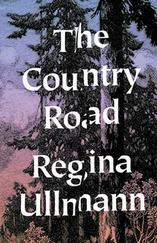They climb out.
He turns his face aside as he hauls the boy up by the armpits. He is much heavier than he looks. Flies buzz around him, but he no longer has a free hand to swat them away. Anna huffs down to grab the feet, and between them they lug him over to the edge of the pit. They lay him down beside it.
“How do we do this?” she asks.
“I don’t know.”
“Swing him in or roll him?”
Neither seems appropriate. They do not move.
“Right.” She bends to grab the feet again. “Come on.”
He just stands there.
“What?”
“I don’t like it.”
“No. I know. I don’t either.”
He hunkers down. They grab handfuls of grey-green serge, drag on limbs, heave and push. The body thumps over on to its side; a hand dangles in. They shove again; there’s a fall of dirt and the body tumbles and scuffs down the side of the pit. It lands awkwardly at an angle, feet higher than the head. The sides of the grave are too oblique, the base not flat enough for dignity; the boy’s neck twists back and he is profiled on the dirt.
The two of them straighten up. He’s about to wipe his mouth, but then lets his arm fall, shakes out unclean hands and wipes them one against the other.
“We’ve made a poor show of this,” he says.
“We haven’t much experience,” she says.
“I’ve only buried dogs before.”
“It’s not the same, is it?”
“No.”
They stand, looking down at the body in the pit.
“There’s the other fellow.”
They turn and go back, and lift him too.
By midday, the bodies are swallowed up and gone. All that’s to be seen is a darker patch on the pale earth, and that is drying out in the sun. They should not be left here. They should not rot into this red earth. Theirs should be the black tilth of home, years from now, decades on. Half a century or more, they could have had. They could have seen the next millennium in, if this century had not turned out to be the shambles that it is.
He wipes his face with his handkerchief and it comes away smeared with red. Anna’s grey Aertex shirt is powdered with red dust and patched with sweat; the sweat and dust make a red mask of her face. She sinks down on the edge of the road and just sits there in the dust. Her head hangs. He folds himself down beside her. He hands her the brandy.
“I’m too thirsty for brandy.” She uncorks the bottle, drinks anyway. “That was a bad thing we did there.”
He nods.
“I feel disgusting.”
“I do too.”
Anna raises the bottle. “To the end of all of this whorehouse mess,” she says. “To the end of this heap of fecking bollocks, this pile of whorish shit, because I have had my fill and more of it, so I have.”
The bundling forth of French and Irish swearing makes him smile, despite himself. She takes another slug of brandy. She goes to wipe the bottleneck, then, having nothing clean on her, not even an inch of sleeve, just hands it over as it is.
“To the end,” he says, and lifts the bottle, and the brandy burns and warms, and seems for a while to help.
—
That evening he has barely drifted into sleep before he’s jerked out of it like a fish on a hook. A whistle in the street. He slips out of bed, leaves Suzanne sleeping. Her lashes long, her hair tumbled and damp. He hadn’t known — or if he had, he had not remembered — that she would be there. Does it mean something that she is there?
From the window he can see a large group of maquis waiting in the street.
Someone yells up: “The sons of whores are on the run! Come on down. We’re to give ’em what for.”
He grabs clothes and boots, runs downstairs to join them. They march down the middle of the road in the blue evening; they talk, they laugh, they make themselves conspicuous. What, after all, do they have to hide? The balance of the world is shifting; everything is sliding and shivering and settling into different patterns once again. This is their land, this is their home; their noisy footfalls are reclaiming it. He finds himself watching their feet as they plant them on the grit; he watches the slow circle of the cycling boys’ legs and he cannot partake of their joy, their comfort, their sense of ease. He is looking out for German low boots on a farmhand’s feet.
The group clumps along the cart tracks; they pick up others at crossroads, they call at cottages; the crowd grows. They descend towards the main road along the valley floor, where an arms cache has already been dug. They drag away bushes; they unpack the wares, divvy up ammunition, pace out the gaps between charges and lay them. Bonhomme hands him a cold Sten and he hefts it in his grip and recalls the green wine bottle flinging itself in fragments up into the air.
Somebody is dishing out hand grenades. One is placed in his palm like an apple. He puts it in his pocket. It weighs his jacket down, makes it droop.
From the south comes the thud of shells, and distant gunfire. Aeroplanes grind invisibly across the sky. The Armée de l’Est is expected to retreat this way. It has tanks and trucks and artillery and an urgent need to be elsewhere. The maquisards have a few charges, a few rifles and a hand grenade each. They have their own self-righteous outrage to compel them: la patrie, le terroir, la revanche. He can feel none of this. We are fleas on a dog’s back, he thinks; the most we’ll do is make it stop and scratch.
He lays the rifle down beside him on the bank and it catches a guilty sheen of the half-light. The hand grenade lies cold against his thigh. His own blood throbs next to it. He supposes he will throw the thing, if he is obliged to. He is not certain that he can bring himself to throw it accurately. In the half-dark, there are shiftings and sighs. To the south, the skirmishing continues. Someone snores.
He drops off the edge of wakefulness and into harbour-water sleep, livid with dreams, with swaying treetops in blue sky, with the stomach-swoop of falling. He dreams his mouth is full of earwigs and he is chewing them up and swallowing just to be rid of them, but they are bitter and he spits and spits and spits, and still he cannot be rid of them. He runs a stick along the railings, and up in the Dublin hills they are blasting granite: boom.
He wakes to the faint crackle of gunfire, the crunch of artillery. He gets up stiffly and stalks off for a piss. Someone smokes a cigarette. It is dawn already and it is cold, and if the Armée de l’Est did retreat last night, then they did not retreat this way.
“Here.” He slips his hand into his pocket, draws out the hand grenade and hands it back.
The maquis walk home in the early-morning cool, rifles shouldered. The boys are skittish, jostling; the older men tramp solidly and speculate. The Armée de l’Est must have got entangled with the Yanks, must be fighting harder than you might have thought conscripted POWs would fight. Or they must have taken another route, out towards Avignon or Aix. But this talk is soon stitched through with hopes for this year’s vintage, the promise of a puppy from the best gun dog’s next litter, a game of pétanque. He walks with them, but is not of them; the talk winds round him while he is silent, and his footfalls land on earth that was never to do with him. At his gate, he swings the gun from his shoulder and hands it back to Bonhomme. Who takes it and claps his arm and says, “Thank you, my friend.”
And then the crowd of them are on their way again, on into the little town.
—
In the dim kitchen, he wipes off some of the dirt, empties a pitcher down his throat, shovels in cold stew. Then he climbs upstairs and falls into bed, turns on his side, and sleeps.
Suzanne, having lain awake in his absence, and listened to the voices in the street and then him blundering around below, now slides out from underneath the covers. She treads barefoot round the house, chewing at her cuticles. The place already feels unfamiliar, as if they had never lived here. She picks up her mending, drops it again. She shunts her bare feet into espadrilles and scuffs out into the sun. Absently, she picks grapes from the trailing vines and eats them, warm with sunshine and not yet ripe, the sourness making her shudder. They turn to dust over her tongue and teeth, and yet she cannot wait for ripeness, sweetness. She picks another grape. She grows accustomed to the bitterness. Aigre, she thinks. It is not actually unpleasant. It is not difficult to bear.
Читать дальше










